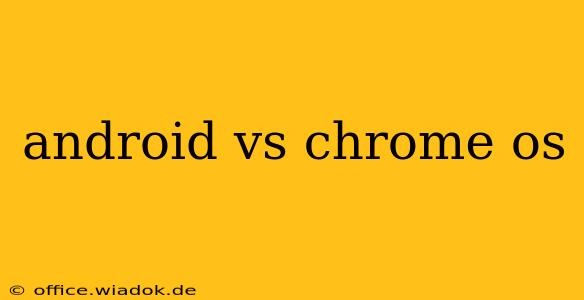Choosing between Android and Chrome OS can feel like choosing between two delicious desserts – both offer sweet features, but cater to different tastes. This in-depth comparison will help you decide which operating system best suits your needs and preferences, exploring everything from core functionality and app ecosystems to hardware capabilities and pricing.
Core Functionality: A Tale of Two Philosophies
At their heart, Android and Chrome OS represent fundamentally different approaches to computing. Android, developed by Google and powering billions of smartphones and tablets, focuses on a deeply integrated mobile experience. It prioritizes touch-based interactions, offering a rich ecosystem of apps designed for mobile devices. Chrome OS, on the other hand, is designed for laptops and Chromebooks, emphasizing simplicity, speed, and cloud connectivity. It leverages the power of the web, with most tasks handled through web apps.
Android: The Mobile Maestro
Android's strength lies in its extensive app library, encompassing everything from productivity tools and gaming behemoths to creative software and niche utilities. Its intuitive touch interface, highly customizable home screens, and seamless integration with other Google services make it a familiar and user-friendly experience for millions. However, this extensive app ecosystem also means more potential for bloatware and security vulnerabilities, necessitating regular updates.
Chrome OS: The Cloud Champion
Chrome OS shines with its speed and simplicity. Booting up is instantaneous, updates are quick and seamless, and the interface is remarkably clean and easy to navigate. Its reliance on web apps means less local storage is required, making it ideal for budget-friendly Chromebooks. However, its dependence on internet connectivity is a significant limitation. Offline functionality is limited, and demanding tasks requiring powerful, resource-intensive applications might be challenging.
App Ecosystems: A World of Difference
The app ecosystems for Android and Chrome OS are starkly contrasting.
Android's App Galaxy
Android boasts the Google Play Store, a vast marketplace hosting millions of apps. This expansive library caters to a diverse range of needs and preferences, encompassing games, productivity tools, creative applications, and more. The sheer volume and variety of apps are undeniable advantages.
Chrome OS's Web-Centric Approach
Chrome OS primarily utilizes web apps, accessed through the Chrome browser. While this offers seamless access to web-based services, it lacks the breadth and depth of native Android applications. However, with the introduction of Android app support on many Chromebooks, the gap is narrowing. Still, the user experience with Android apps on Chrome OS isn't always as smooth as on dedicated Android devices.
Hardware: Form Factor and Capabilities
Android powers a vast range of devices, from budget-friendly smartphones to high-end tablets. The hardware variety is immense, reflecting a wide spectrum of price points and capabilities.
Chrome OS, on the other hand, is predominantly found on Chromebooks – laptops designed for simplicity, affordability, and portability. While high-end Chromebooks exist, the overall hardware range is less diverse than that of Android devices.
Price Point: Accessibility and Value
Both Android and Chrome OS offer devices across a range of price points. Budget-friendly Android phones and Chromebooks are readily available, making them accessible to a wide audience. However, high-end Android phones and Chromebooks can be significantly more expensive, reflecting their advanced features and capabilities.
Conclusion: The Verdict Depends on Your Needs
Ultimately, the "better" operating system depends entirely on your individual needs and preferences.
Choose Android if:
- You prioritize a vast app library and a deeply integrated mobile experience.
- You need offline functionality and powerful native apps.
- You value a highly customizable and visually appealing interface.
Choose Chrome OS if:
- You prioritize speed, simplicity, and cloud connectivity.
- You primarily use web-based applications and services.
- You need a budget-friendly, portable laptop with long battery life.
This comprehensive comparison should empower you to make an informed decision, selecting the operating system that perfectly aligns with your digital lifestyle.

